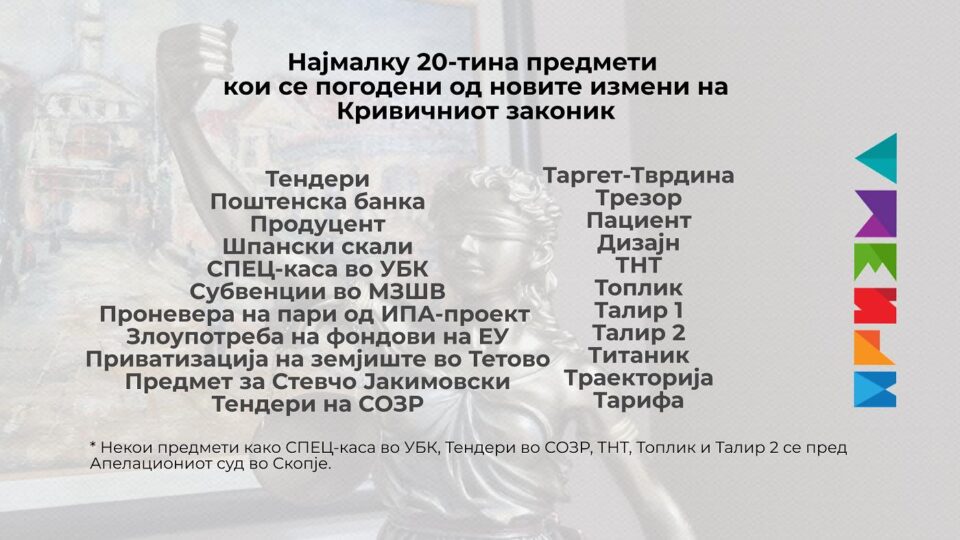The unexpected changes to the Criminal Code, that were adopted in the Macedonian Parliament using an express procedure that strictly limits discussion, caused a new political crisis in the country.
The changes eliminate the article on Criminal Association – a broadly defined “crime” that punishes people for joining together in the pursuit of a criminal activity. It’s meant to be a companion charge to actual, real crimes, but was often misused in the political persecution of opposition officials, especially after the Colored Revolution and the SDSM takeover of power.
The changes also greatly reduce the penalty for abuse of office – a curious priority for the Parliament, as it helps only corrupt Government officials. The reduction in the sentence and in the period of time that activates the statute of limitations, could allow already sentenced office holders to seek early release or commutation of their sentences into suspended ones.
The changes to the law were adopted by a slim majority of the ruling SDSM and DUI parties, with the opposition VMRO-DPMNE voting against, after a very limited debate. This is in line with the European flag procedure, which allows a law to be adopted in a matter of a few days, limiting the usual ways of filibustering, if it aligns Macedonia’s laws with those of the European Union. The Government has tried strongly to insist that the law does that, and reduces what it calls “Draconian” penalties. This claim did not generate much sympathy in the public, which is flooded with daily reports of corruption on the part of the Government officials and so does not consider reduction in the prison terms for the few that eventually get caught as a high priority. The Government also tried to focus attention to other articles of the law, such as making it easier to confiscate property whose origin the office holder could not explain, but it remains unclear why this could not be the only change in the law.
The practical effects of the changes to the law were quickly made apparent and caused outrage mainly among SDSM supporters, who believe that the continued political persecution of VMRO-DPMNE officials is what keeps them in power. The changes will lead to the nullification or reduction of sentences in the main criminal cases against the VMRO officials from the time of Nikola Gruevski. This includes the cases over the construction of two major highways with the Chinese Sinohydro company, the case of mass wiretapping that was used as an excuse to start the Colored Revolution, several corruption investigations into the Skopje 2014 urban renewal project, allegations of election irregularities, a case against Karpos Mayor Stevce Jakimovski, and many others. The cases include former security chief Saso Mijalkov, former Transportation Minister Mile Janakieski, and former Interior Minister Gordana Jankuloska who has been imprisoned since 2020.
The remaining supporters of the Colored Revolution have been outraged by this move coming from their SDSM party. They insist that the law is an amnesty of VMRO officials, who they still blame of unique corruption and wrongdoing. The current VMRO-DPMNE leadership has also condemned the law, insisting that it will primarily help SDSM and DUI officials, who actually voted for it, escape accountability for their own off-the-charts corruption. Some have speculated that the changes are part of an agreement between VMRO and SDSM – the theory goes that VMRO wants an amnesty for its former officials, and an end to the continued persecution of the opposition, and in exchange for it, will vote for the constitutional amendments that would include the Bulgarian nation in the Macedonian Constitution. Bulgaria blocks Macedonia’s EU accession talks insisting that this concession is made first. But this allegation collapsed recently, as VMRO President Hristijan Mickoski, in a discussion with the German FAZ newspaper, revealed that former VMRO leader Gruevski, who could possibly end his exile in Hungary thanks to this change in the law, is actually secretly coordinating his actions with SDSM and DUI. Mickoski accused Gruevski of agreeing to undermine his own party and divide it from the inside, ahead of the coming elections, in exchange for an amnesty. Gruevski responded angrily to this allegation and there is now an open feud between the two.
This feud opened the prospect of a different strategy on the part of DUI and SDSM – that they are offering amnesty to former VMRO officials on their own, without any agreement with the current party leadership – in fact working directly against the party, and trying to divide it.





Comments are closed for this post.